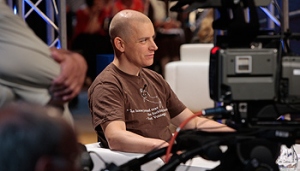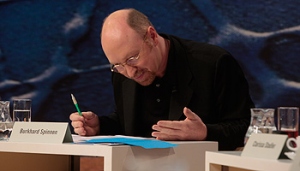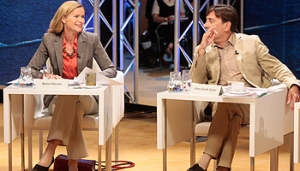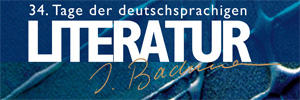 Aleks Scholz (Bild: Johannes Puch)
Aleks Scholz (Bild: Johannes Puch)
Aleks Scholz (D)
Aleks Scholz read “Google Earth”. The jury’s discussion of the text escalated, and the response was generally good – only one of the jurors completely refused to go along with it.
Story of two neighbours
Two neighbours called Liebke and Trampe, a hedge – cut on one side, overgrowing on the other – and a fountain that finally turns into a self-dug grave: Aleks Scholz tells all that from the perspective of “Google Earth”.
The text by Scholz was proposed by juror Hubert Winkels.
Author portrait
Reading
Discussion
“Calm text that creates tension”
“A very calm text that is able to create a great deal of tension”, was Alain Claude Sulzer’s praise. The text’s “oscillating” is a basic principle and the text works with close and distant views, threats and opposites.
 Aleks Scholz (Bild: Johannes Puch)
Aleks Scholz (Bild: Johannes Puch)
Juror would have liked to see a novel
For Sulzer, who saw “many beautiful things” in and about the text, and was therefore “quite enthusiastic”, it was a “flawless text”. The juror would have liked to see it as a novel, but the author had to disappoint: Google Earth is a text in its own right.
“Linguistic precision”
Hildegard Elisabeth Keller also recognised that the text has several “considerable merits”: “the extraordinary linguistic precision, its accuracy”. She was particularly taken by the description of the acoustic phenomena. In this “extremely quiet world”, the reader does not hear a single word spoken. The two peasants remind her a little of the two peasants in “A Village Romeo and Juliet”.
“The camera points to two lives”
“Very charming” is the author’s attitude of pointing the camera to two lives, two farmsteads and “keeping it there”, concluded Karin Fleischanderl, who largely agreed with the favourable criticism of her colleagues, “even though this attitude is not always hung on to”, because the author “knows too much” – which is betrayed by the “ironic tone of voice” of the author.
 Burkhard Spinnen (Bild: Johannes Puch)
Burkhard Spinnen (Bild: Johannes Puch)
“Attempt at self-compositing?”
“Perhaps the crime lies in logging into Google Earth, or perhaps it’s a particularly clever attempt at self-composting , juror Paul Jandl surmised. He believes that the text is a “mathematical test arrangement”: “cone, circle, line – almost like a mathematical equation”. It adds up, it’s well done, Jandl believes, but he would also be interested to know whether a crime did take place. “You can read the text several times and interpret it in different ways.”
Spinnen did not like the flawlessness
“It’s flawless, yes”, Burkhard Spinnen began, “and I noticed that I didn’t like precisely this aspect of it.” “I read it several times with fascination, also because I am a Google Earth junkie.” The “top view” permits “an infinite number of games”, because the text really tries to introduce into literary history Google Earth as a narrative perspective.
A major problem is the text’s “heartlessness”, which he doesn’t know how to deal with. The characters are “lost and condemned from the outset”.
 Meike Feßmann und Alain Claude Sulzer (Bild: Johannes Puch)
Meike Feßmann und Alain Claude Sulzer (Bild: Johannes Puch)
Text lacks the imaginary
Meike Feßmann also didn’t like quite a bit of it, for example that the text portrays “the real”, while entirely lacking in the imaginary: “The text only helps itself to exterior images – which is quite interesting to begin with, but the text is too self-referential and completely evades participation.”
“Cold view of reality”
Karin Fleischanderl, on the other hand, liked the “cold view of reality”, but she would have “left out” a few sentences. Nonetheless: “a very charming text”.
Barbara Johanna Frank
 TDDl 2010
TDDl 2010